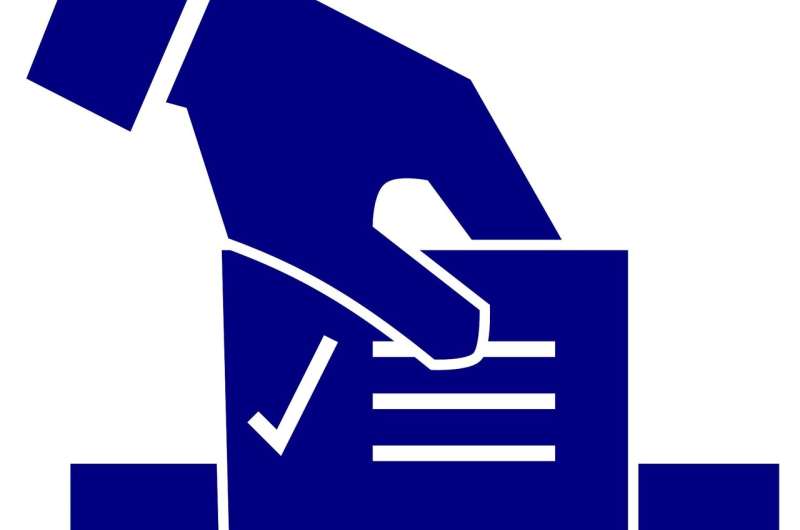This article has been reviewed according to Science X's editorial process and policies. Editors have highlighted the following attributes while ensuring the content's credibility:
fact-checked
trusted source
written by researcher(s)
proofread
How to decide how to vote—a psychologist's advice

One of the things I often hear as an emotions researcher is that emotions should not "cloud" people's decisions, that they get in the way, or that they are irrational.
But emotions are a critical part of the human experience, and indeed in making decisions. They help people to process information, form goals and guide behavior. So if you're struggling to decide how to vote in the UK general election don't ignore or discount your emotions. In fact, it's important to be aware of how politicians may try to tap into voters' emotional state.
Emotions are rooted in appraisals of meaningful events. This leads to "action tendencies," which means the creation of intentions or readiness for a certain type of action.
We feel angry when we think something is unjust, and can feel propelled to change it, often using force. We feel guilty when we (or our group) have wronged others, and may be motivated to make amends through reparations or change. We feel hopeful when we see a possibility to improve our situation, and this can drive us to achieve a goal that is important to us.
Awareness of our emotions can help us to predict what events will elicit which emotions, and how these emotions shape our responses and behavior.
This is even more important when we are trying to make decisions when the stakes are high or there's an overwhelming amount of information, such as the forthcoming UK general election. Political parties and politicians do not underestimate the power of emotions—neither should we.
Three emotions particularly relevant in the run-up to elections are fear, anxiety and hope. What these emotions have in common is a sense of low control over outcomes.
Fear and anxiety increase people's sensitivity to threat. Research shows that fear and anxiety trigger increased attention and information processing, but that this cognitive processing is often biased in political situations, reducing openness to opportunities for change.
In extreme cases, fear can even increase people's support for aggressive policies towards people seen as a "danger." Narratives invoking fear will warn and caution, promising stability and security.
Hope, on the other hand, is a pleasant emotion which is induced when we imagine a positive and desired goal in the future.
A 2010 study of US national survey data found the extent to which Barack Obama made respondents feel hopeful served as a strong and reliable predictor that they voted for him.
Like fear, hope also involves a sense of uncertainty. But hope comes with a feeling of opportunity. A 2015 study found belief in a changing world increased participants' support for concessions in the Israel-Palestine conflict. Hope can increase openness to different perspectives and open mindedness in decision making. Research has also shown hope can encourage cooperative negotiation and collective action, which are critical in creating change.
Narratives using hope will paint ideal pictures of the future, making promises and enumerating countless possibilities.
What you can do
When you are trying to decide who to vote for, my advice is to take back control of your emotions. Think about what you fear and what things in the future make you worry about yourself, your family, your community or your country. Next, ask yourself what you hope for in your personal life and for your city or region.
Take note of what things feel important to you when you're trying to imagine a better future.
Only then should you seek information about politicians and the parties they belong to, keeping in mind your emotions and the priorities and values they inform you of.
Acknowledge how different discussions, statements, parties and candidates make you feel and identify why. When you engage with information presented by a political party or candidate, we should ask—what is it that they want me to feel and why? Are they trying to induce fear (of the other, of the future, of change). Are they presenting an idyllic future so that I don't notice it is unrealistic?
This approach can help you to uncover your own goals and intentions, as well as to differentiate information from exaggerated wording. Studies have shown that this exercise, known as cognitive reappraisal, can help to regulate emotional responses.
Emotional regulation, the process of influencing emotional responses, is a growing field in psychology.
Indirect emotion regulation means using interventions or general messages, such as putting forward a perception of people as malleable, to change the way other people may experience emotions and process events. This may be used by educators, psychologists and politicians, and has been found useful in extreme conflicts, when people are reluctant to change their attitudes.
On the other hand, direct emotion regulation is when we choose to change our emotions to drive functional responses, that are based on our values and goals, to events or information.
Both approaches can improve our decision making and our understanding of the role of emotions in decision-making processes.
Provided by The Conversation
This article is republished from The Conversation under a Creative Commons license. Read the original article.![]()




















